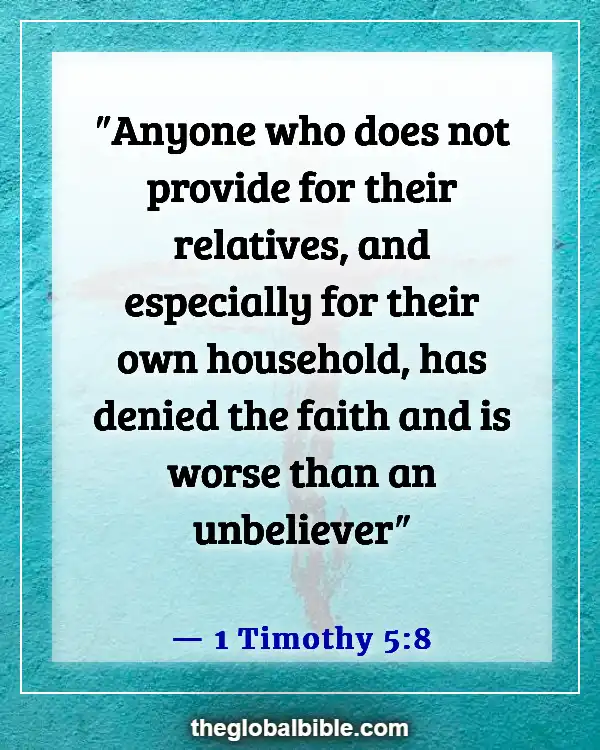Dear brothers and sisters, I hope this message finds you well. Today, we’ll talk about the important responsibility of caring for our parents, as guided by the teachings of the Bible. If you find this helpful, please share it with others who might benefit from these insights.
The Bible teaches us that honoring our parents is a lifelong duty. This means more than just obeying them; it involves showing deep respect, love, and care. Even in our busy lives, we should not forget the sacrifices our parents have made for us. They have nurtured us, taught us important lessons, and stood by us during both good and challenging times. By honoring them, we express our gratitude for their constant love and guidance.
There are stories in God’s Word that show people caring for their elderly parents, teaching us about compassion, patience, and dedication. Caring for our aging parents gives us a chance to give back and appreciate all they have done for us. It’s also a time to learn selflessness and to cherish the moments we have with them.
Balancing the care of our parents with our own family responsibilities can be difficult. The Bible gives us wisdom on how to manage this balance. We need to be present for both our parents and our immediate family. This requires good communication, time management, and sometimes reaching out for help. By finding this balance, we set a good example for our children about the importance of family and caring for others.
The Bible also tells us about the blessings that come from caring for our parents. This act of love can lead to stronger family bonds and personal growth. It’s not just a duty but a chance to show our faith through our actions. When we care for our parents, we feel the joy that comes from living out our beliefs through love and service.
Supporting our parents financially, especially as they age, is another meaningful way to honor them. It’s a practical way to show gratitude and ensure their well-being. This support can come in different forms, from direct help to managing their resources wisely. It shows our commitment to family and our desire to honor the legacy our parents have built.
Dealing with difficult parents can be a challenge, but the Bible guides us to handle these situations with patience and forgiveness. We must remember that our parents are human and imperfect, just like us. By showing love and respect even in tough times, we demonstrate strength of character and grow in our understanding and patience.
Dear friends, let’s now reflect on the scriptures that speak about taking care of your parents, and let them inspire us in our journey to honor and care for those who have given us so much.
Contents
- 1 What Does the Bible Say About Honoring Your Parents?
- 2 Biblical Examples of Caring for Elderly Parents
- 3 How to Balance Caring for Parents and Your Own Family
- 3.1 Proverbs 1:8 – Heed parental instruction
- 3.2 1 Timothy 5:8 – Provide for family and parents
- 3.3 Colossians 3:21 – Encourage, do not discourage children
- 3.4 Ephesians 5:33 – Love spouse; respect husband
- 3.5 Mark 7:10 – Honor parents, biblical command
- 3.6 Matthew 15:5-6 – Tradition over caring for parents
- 4 Scriptures on the Blessings of Caring for Parents
- 5 Biblical Guidance on Supporting Parents Financially
- 6 Dealing with Difficult Parents: A Biblical Perspective
- 7 Conclusions
What Does the Bible Say About Honoring Your Parents?
Honoring our parents is a foundational principle that is deeply rooted in biblical teachings. It is not just about obedience but also encompasses respect, love, and care. Honoring parents is a lifelong commitment that fosters strong family bonds and reflects the values of gratitude and humility. In our fast-paced world, it’s essential to remember the sacrifices our parents have made. They have nurtured us, taught us, and supported us through life’s ups and downs. By honoring them, we acknowledge their role in shaping our lives and express our appreciation for their unwavering love and guidance. This principle also teaches us about responsibility and the importance of passing down these values to future generations, creating a cycle of love and respect that strengthens families and communities.
Exodus 20:12 – Honor and care for parents

“Honor your father and your mother, so that you may live long in the land the Lord your God is giving you”— Exodus 20:12
Exodus 20:12 states, “Honor your father and your mother, so that you may live long in the land the Lord your God is giving you.” This verse is part of the Ten Commandments and emphasizes the importance of respecting and valuing parents. Honoring parents goes beyond mere obedience; it involves caring for them, showing gratitude, and supporting them in their needs. The promise of a long life in the land signifies the blessings that come from maintaining strong family bonds and fulfilling this divine command.
Ephesians 6:2 – Honor your father and mother

“Honor your father and mother”—which is the first commandment with a promise—”— Ephesians 6:2
Ephesians 6:2 emphasizes the importance of honoring one’s father and mother, highlighting this commandment as foundational to building strong family relationships. This verse, quoting the fifth commandment from the Old Testament, underscores the value of respect, obedience, and gratitude toward parents. In the context of caring for parents, it serves as a reminder that honoring them involves not only respect but also ensuring their well-being and support, reflecting a commitment to family and moral responsibility.
Deuteronomy 5:16 – Honor parents for long life

“Honor your father and your mother, as the Lord your God has commanded you, so that you may live long and that it may go well with you in the land the Lord your God is giving you”— Deuteronomy 5:16
Deuteronomy 5:16 emphasizes the importance of honoring one’s parents as a fundamental commandment. It instructs individuals to show respect, love, and care for their parents, promising a reward of a long and prosperous life in return. This verse highlights the value placed on familial relationships within the Bible and underscores the duty of children to support and cherish their parents. By honoring parents, individuals contribute to a harmonious society and fulfill a divine principle that extends beyond mere obligation.
Proverbs 23:22 – Listen and honor your parents

“Listen to your father, who gave you life,
and do not despise your mother when she is old”— Proverbs 23:22
Proverbs 23:22 emphasizes the importance of listening to and honoring one’s parents, highlighting the wisdom in valuing their guidance. This verse reflects the broader biblical principle of respecting and caring for parents, especially as they age. It encourages individuals to heed the lessons and experiences shared by their parents, acknowledging their role in shaping one’s life. By honoring and listening to parents, we fulfill a fundamental biblical commandment, fostering respect, gratitude, and love within the family.
Colossians 3:20 – Children obeying pleases the Lord

“Children, obey your parents in everything, for this pleases the Lord”— Colossians 3:20
Colossians 3:20 emphasizes the importance of children obeying their parents as a way to honor them, which is pleasing to the Lord. This verse highlights the broader biblical principle of respecting and valuing our parents, not just as a duty, but as a way to live in accordance with God’s will. By obeying and honoring our parents, we not only foster harmonious family relationships but also demonstrate our commitment to living a life that is pleasing to God.
Matthew 15:4 – Honor parents, God’s commandment

“For God said, ‘Honor your father and mother’ and ‘Anyone who curses their father or mother is to be put to death”— Matthew 15:4
Matthew 15:4 emphasizes God’s commandment to honor one’s parents, highlighting its importance in biblical teachings. This verse reflects the value placed on familial respect and care, as honoring parents is directly linked to obedience to God’s laws. In the context of taking care of parents, this verse underscores the responsibility children have to respect, support, and cherish their parents, aligning with the broader biblical theme of love and respect within the family.
Biblical Examples of Caring for Elderly Parents
The Bible provides numerous examples of individuals who cared for their elderly parents, showcasing the importance of this duty in a believer’s life. These stories highlight the virtues of compassion, patience, and dedication. Caring for aging parents is an opportunity to give back and show gratitude for the years of care and support they have provided. It teaches us about selflessness and prioritizing family, as well as the importance of cherishing the time we have with our loved ones. By following these examples, we learn the significance of family unity and the fulfillment that comes from serving those who raised us. These biblical accounts inspire us to approach this responsibility with love and humility, honoring our parents in their later years.
John 19:26-27 – Jesus entrusts Mary to John
“When Jesus saw his mother there, and the disciple whom he loved standing nearby, he said to her, “Woman, here is your son,” and to the disciple, “Here is your mother.” From that time on, this disciple took her into his home”— John 19:26-27
In John 19:26-27, as Jesus hangs on the cross, he sees his mother, Mary, and the disciple whom he loved, John, standing nearby. Demonstrating profound care and responsibility, Jesus entrusts Mary to John’s care, saying, “Woman, here is your son,” and to John, “Here is your mother.” This act exemplifies the biblical principle of honoring and caring for one’s parents, even in difficult circumstances, highlighting the importance of ensuring their well-being within the Christian faith.
Ruth 4:15 – Sustaining and caring for family

“He will renew your life and sustain you in your old age. For your daughter-in-law, who loves you and who is better to you than seven sons, has given him birth”— Ruth 4:15
Ruth 4:15 highlights the importance of caring for family, particularly the elderly. In this verse, Ruth’s devotion to Naomi is celebrated, as her actions provide Naomi with renewed hope and sustenance in her old age. This verse exemplifies the biblical principle of honoring and caring for one’s parents and elders. Ruth’s love and dedication serve as a model for supporting family members, showcasing the blessings that come from nurturing and sustaining those who once cared for us.
Genesis 47:12 – Joseph provides for his family
“Joseph also provided his father and his brothers and all his father’s household with food, according to the number of their children”— Genesis 47:12
In Genesis 47:12, Joseph exemplifies the biblical principle of caring for one’s family by providing sustenance for his father, brothers, and their households during a time of famine. This verse highlights Joseph’s role as a responsible and loving son, ensuring the well-being of his elderly father, Jacob. It serves as a powerful example of filial duty and compassion, underscoring the importance of supporting and honoring our parents, especially in their time of need.
1 Timothy 5:4 – Care for family as duty

“But if a widow has children or grandchildren, these should learn first of all to put their religion into practice by caring for their own family and so repaying their parents and grandparents, for this is pleasing to God”— 1 Timothy 5:4
1 Timothy 5:4 emphasizes the importance of caring for one’s family, especially elderly parents, as a fundamental Christian duty. The verse instructs believers to demonstrate their faith by repaying their parents through acts of love and support. This care is seen as pleasing to God and aligns with biblical teachings on honoring one’s father and mother. By fulfilling this responsibility, individuals not only provide for their family’s needs but also uphold a key aspect of Christian living and moral obligation.
How to Balance Caring for Parents and Your Own Family
Balancing the care of parents with the responsibilities of your own family is a challenge many face today. The Bible offers wisdom on maintaining balance and setting priorities. It teaches us to be present and attentive to the needs of both our parents and our immediate family. This balance requires clear communication, time management, and sometimes seeking external support. The key is to maintain harmony and ensure that neither relationship suffers from neglect. By doing so, we model a life of service and responsibility for our children, teaching them the value of family and the joy of caring for others. This balance also emphasizes the importance of self-care, ensuring that we have the strength and energy to fulfill our duties with love and compassion.
Proverbs 1:8 – Heed parental instruction

“Listen, my son, to your father’s instruction
and do not forsake your mother’s teaching”— Proverbs 1:8
Proverbs 1:8 emphasizes the importance of listening to parental guidance: “Listen, my son, to your father’s instruction and do not forsake your mother’s teaching.” In the context of balancing care for both parents and your own family, this verse highlights the value of wisdom passed down through generations. By heeding parental advice, you honor their role in your life while also learning how to responsibly care for your own family, creating a harmonious balance between these essential relationships.
1 Timothy 5:8 – Provide for family and parents

“Anyone who does not provide for their relatives, and especially for their own household, has denied the faith and is worse than an unbeliever”— 1 Timothy 5:8
1 Timothy 5:8 emphasizes the importance of providing for one’s family, highlighting that neglecting this duty equates to denying one’s faith. This verse calls for a balanced approach to caring for both parents and one’s immediate family, as both are integral to familial and spiritual responsibilities. It encourages believers to prioritize their family’s needs, reinforcing the notion that caring for parents is a vital expression of faith and love, integral to living out Christian values.
Colossians 3:21 – Encourage, do not discourage children

“Fathers, do not embitter your children, or they will become discouraged”— Colossians 3:21
Colossians 3:21 emphasizes the importance of nurturing and encouraging children, cautioning against actions that lead to their discouragement or resentment. In the context of balancing care for parents and one’s own family, this verse serves as a reminder to foster a supportive and positive environment for children, ensuring they feel valued and uplifted. By promoting encouragement at home, you create a harmonious family dynamic that allows you to effectively care for both your parents and your children, maintaining healthy relationships across generations.
Ephesians 5:33 – Love spouse; respect husband

“However, each one of you also must love his wife as he loves himself, and the wife must respect her husband”— Ephesians 5:33
Ephesians 5:33 emphasizes the mutual responsibilities within a marriage, urging husbands to love their wives and wives to respect their husbands. In the context of balancing care for parents and one’s own family, this verse underscores the importance of maintaining a strong marital relationship as a foundation. By fostering love and respect at home, couples can collaboratively support and care for their parents, ensuring that their primary family unit remains harmonious and resilient while fulfilling broader familial responsibilities.
Mark 7:10 – Honor parents, biblical command

“For Moses said, ‘Honor your father and mother,’ and, ‘Anyone who curses their father or mother is to be put to death”— Mark 7:10
Mark 7:10 emphasizes the biblical command to honor one’s parents, highlighting its importance in both the Old and New Testaments. This verse recalls the Mosaic law, underscoring the duty to respect and care for parents as a divine mandate. Balancing this with caring for one’s own family can be challenging, but it is integral to Christian life. The verse serves as a reminder that honoring parents is not only a personal responsibility but also a spiritual obligation, reflecting God’s design for family relationships.
Matthew 15:5-6 – Tradition over caring for parents
“But you say that if anyone declares that what might have been used to help their father or mother is ‘devoted to God,’ they are not to ‘honor their father or mother’ with it. Thus you nullify the word of God for the sake of your tradition”— Matthew 15:5-6
Matthew 15:5-6 highlights the tension between religious traditions and genuine care for parents. In this passage, Jesus criticizes those who use traditions as excuses to neglect honoring their parents, underlining the importance of caring for family. The verse challenges readers to balance familial responsibilities, emphasizing that true devotion to God includes honoring and supporting parents. This teaching encourages us to evaluate how we prioritize our duties, ensuring that religious practices do not overshadow the essential commandment to care for our loved ones.
Scriptures on the Blessings of Caring for Parents
The Bible speaks to the blessings that come from caring for our parents, promising rewards both in this life and beyond. This act of love and duty often leads to strengthened family bonds, personal growth, and a deep sense of fulfillment. Caring for parents is not only a commandment but also an opportunity to demonstrate faith in action. The blessings of this commitment manifest in various ways, such as peace, joy, and the assurance of God’s favor. These scriptures encourage us to approach this responsibility with a willing heart, knowing that our efforts are recognized and cherished by God. As we care for our parents, we experience the profound joy that comes from living out our faith through love and service.
Proverbs 20:20 – Cursing parents leads to darkness
“If someone curses their father or mother,
their lamp will be snuffed out in pitch darkness”— Proverbs 20:20
Proverbs 20:20 warns against cursing one’s parents, stating that such actions lead to darkness. In the context of caring for parents, this verse highlights the importance of honoring and respecting them. Cursing parents symbolizes a lack of gratitude and appreciation, which can result in spiritual and moral consequences, akin to living in darkness. By contrast, caring for and respecting parents brings blessings, fostering a life illuminated by love, wisdom, and divine favor, aligning with biblical principles of familial honor and care.
Ephesians 6:1-3 – Honor parents, receive blessings

“Children, obey your parents in the Lord, for this is right. “Honor your father and mother”—which is the first commandment with a promise— “so that it may go well with you and that you may enjoy long life on the earth”— Ephesians 6:1-3
Ephesians 6:1-3 emphasizes the importance of honoring and obeying one’s parents, as it is a commandment with a promise. The passage cites the fifth commandment, highlighting that respecting parents leads to well-being and longevity. This verse underscores the reciprocal relationship between honoring parents and receiving blessings. In the context of caring for parents, it reminds us that such actions are not only dutiful but also bring divine favor and fulfillment, enriching both personal and familial life.
1 Peter 5:5 – Humility and respect for elders

“In the same way, you who are younger, submit yourselves to your elders. All of you, clothe yourselves with humility toward one another, because“God opposes the proud
but shows favor to the humble”— 1 Peter 5:5
1 Peter 5:5 emphasizes the importance of humility and respect, particularly towards elders. In the context of caring for parents, this verse highlights the blessings that come from honoring and submitting to those who have nurtured and guided us. By clothing ourselves in humility, as the verse instructs, we create a harmonious relationship with our parents, recognizing their wisdom and sacrifices. This respect not only aligns with Christian values but also fosters a loving environment where families can thrive.
Matthew 19:19 – Honor and love your parents

“Honor your father and mother,’ and ‘love your neighbor as yourself”— Matthew 19:19
Matthew 19:19 emphasizes the importance of honoring and loving your parents, which is a fundamental tenet of Christian values. This verse reinforces the commandment to “Honor your father and mother,” highlighting the blessings that come from caring for one’s parents. By showing love and respect, we fulfill a sacred duty that strengthens family bonds and reflects God’s love. It reminds us that honoring our parents isn’t just a duty but a path to receiving divine blessings and fostering harmony within the family.
Biblical Guidance on Supporting Parents Financially
Financial support for parents is another aspect of honoring them, especially as they age and their ability to provide for themselves diminishes. The Bible encourages us to support our parents financially, reflecting our gratitude and respect. This support is a tangible way to honor them and ensure their well-being. It requires a thoughtful approach, balancing generosity with our own financial responsibilities. By providing for our parents, we fulfill a God-given duty and demonstrate the love and care that they have shown us throughout our lives. This financial support can take many forms, from direct assistance to managing their resources wisely. It is a testament to our commitment to family and our desire to honor the legacy our parents have built.
Mark 7:9-13 – Honor parents over tradition
“He continued, “You have a fine way of setting aside the commands of God in order to observe your own traditions! For Moses said, ‘Honor your father and mother,’ and, ‘Anyone who curses their father or mother is to be put to death.’ But you say that if anyone declares that what might have been used to help their father or mother is Corban (that is, devoted to God)— then you no longer let them do anything for their father or mother. Thus you nullify the word of God by your tradition that you have handed down. And you do many things like that”— Mark 7:9-13
In Mark 7:9-13, Jesus criticizes the Pharisees for allowing traditions to override God’s commandments, specifically the duty to honor one’s parents. He condemns the practice of “Corban,” where individuals would dedicate resources to God as an excuse to neglect parental support. This passage underscores the importance of prioritizing familial responsibility over religious traditions. It serves as a reminder that true obedience to God involves caring for and supporting parents, emphasizing compassion and duty over ritualistic practices.
Proverbs 28:24 – Stealing from parents brings trouble

“Whoever robs their father or mother
and says, “It’s not wrong,”
is partner to one who destroys”— Proverbs 28:24
Proverbs 28:24 warns against the sin of stealing from one’s parents, emphasizing the gravity of such an act. The verse highlights that taking from parents and justifying it as permissible is akin to aligning with destructive behavior. This serves as a cautionary reminder of the moral and spiritual obligation to honor and support one’s parents, including financially. Upholding this duty not only maintains familial harmony but also aligns with biblical teachings on respect and righteousness within the family unit.
Proverbs 19:26 – Disgrace from mistreating parents

“Whoever robs their father and drives out their mother
is a child who brings shame and disgrace”— Proverbs 19:26
Proverbs 19:26 warns against the disgrace that comes from mistreating one’s parents. This verse highlights the moral obligation to support and respect parents, especially as they age. Financial and emotional care for parents is a central theme, emphasizing that neglect or harm towards them not only brings dishonor but also reflects a lack of wisdom and integrity. Upholding the dignity of parents through support is a key aspect of living a righteous and respectful life according to biblical teachings.
Dealing with Difficult Parents: A Biblical Perspective
Dealing with difficult parents can be a challenging aspect of honoring them, yet the Bible offers guidance and encouragement. It teaches us to approach these situations with patience, compassion, and forgiveness. Understanding that our parents, like all humans, are imperfect, allows us to extend grace and love even in challenging circumstances. This perspective calls us to rise above difficulties and maintain a respectful and loving relationship. It is important to set healthy boundaries while still fulfilling our responsibilities. By doing so, we demonstrate strength of character and a commitment to the biblical principle of honoring parents. This practice helps us grow in patience and understanding, ultimately strengthening our relationships and fostering a spirit of reconciliation and peace.
Ephesians 4:2 – Be humble, gentle, patient, loving

“Be completely humble and gentle; be patient, bearing with one another in love”— Ephesians 4:2
Ephesians 4:2 encourages us to approach relationships with humility, gentleness, patience, and love. When dealing with difficult parents, this verse offers a biblical perspective on maintaining a respectful and compassionate attitude. By embodying these virtues, we can navigate challenging interactions with grace and understanding. This approach not only honors our parents but also reflects the love and patience Christ shows us, fostering a more harmonious and loving family environment.
Colossians 3:13 – Forgive as the Lord forgave

“Bear with each other and forgive one another if any of you has a grievance against someone. Forgive as the Lord forgave you”— Colossians 3:13
Colossians 3:13 urges us to “bear with each other and forgive one another if any of you has a grievance against someone. Forgive as the Lord forgave you.” In the context of taking care of difficult parents, this verse highlights the importance of patience and forgiveness. As we encounter challenges, remembering how God has abundantly forgiven us can inspire us to extend grace and compassion to our parents, fostering healing and understanding in these complex relationships.
Romans 12:18 – Live at peace with everyone

“If it is possible, as far as it depends on you, live at peace with everyone”— Romans 12:18
Romans 12:18 encourages believers to “live at peace with everyone,” highlighting the importance of fostering harmonious relationships. In the context of taking care of difficult parents, this verse urges us to strive for peace and understanding, even when faced with challenges. It reminds us to approach conflicts with grace and empathy, seeking reconciliation and maintaining respect. By prioritizing peace, we honor our parents and reflect the love and patience that God calls us to embody in all relationships.
1 Peter 4:8 – Love covers many sins

“Above all, love each other deeply, because love covers over a multitude of sins”— 1 Peter 4:8
1 Peter 4:8 emphasizes the importance of love, stating that “love covers a multitude of sins.” In the context of caring for difficult parents, this verse highlights the power of love to overcome challenges and foster forgiveness. By approaching strained relationships with compassion and patience, we can navigate conflicts more gracefully. Love acts as a bridge, allowing us to see beyond imperfections and maintain harmony, ultimately fulfilling our biblical duty to honor and care for our parents.
Proverbs 15:1 – Gentle words defuse anger

“A gentle answer turns away wrath,
but a harsh word stirs up anger”— Proverbs 15:1
Proverbs 15:1 teaches that a gentle response can diffuse anger, highlighting the power of calm and kind words. When dealing with difficult parents, this verse encourages us to approach conversations with patience and understanding. By responding with gentleness, we can foster peace and improve communication, even in challenging situations. This approach not only honors our parents but also aligns with the biblical principle of showing love and respect, which is essential in maintaining harmonious family relationships.
Matthew 5:44 – Love and pray for enemies

“But I tell you, love your enemies and pray for those who persecute you”— Matthew 5:44
Matthew 5:44, which instructs to “love your enemies and pray for those who persecute you,” offers profound guidance for dealing with difficult parents. While parents may not be traditional “enemies,” conflicts can arise. This verse encourages us to approach these challenges with love and prayer, fostering understanding and compassion. By applying this teaching, we honor our parents and maintain a Christ-like attitude, even in trying relationships, ultimately strengthening familial bonds and embodying Christian love.
Conclusions
In conclusion, the Bible provides clear guidance on our responsibility to honor and care for our parents. By studying these verses and examples, we gain insight into God’s heart for family relationships and the importance He places on respecting and supporting those who raised us. As we apply these teachings to our lives, we learn to balance our various responsibilities, show compassion, and extend grace even in challenging situations.
The wisdom found in Scripture reminds us that caring for our parents is not just a duty, but an opportunity to demonstrate love, gratitude, and obedience to God. It teaches us valuable lessons about selflessness, patience, and the cyclical nature of life. By following these biblical principles, we can strengthen our family bonds, set a positive example for future generations, and experience the blessings that come from honoring our parents.
Ultimately, these teachings encourage us to view caring for our parents as an act of worship and a reflection of God’s love. As we strive to embody these principles, we grow in our faith, develop Christ-like character, and contribute to a culture that values and respects the elderly. By doing so, we not only fulfill our biblical obligations but also create a legacy of love and care that extends far beyond our immediate family.

More Bible Topics